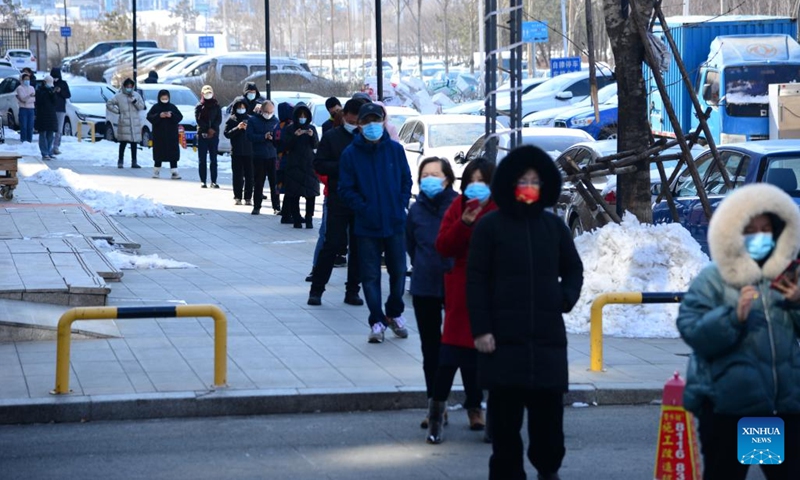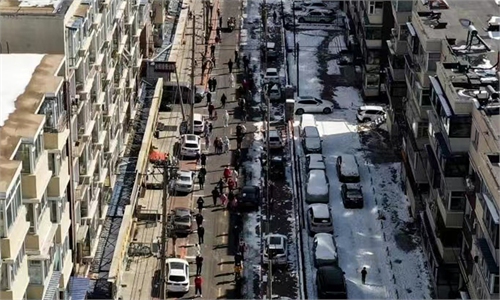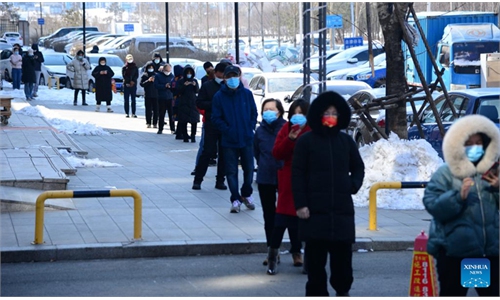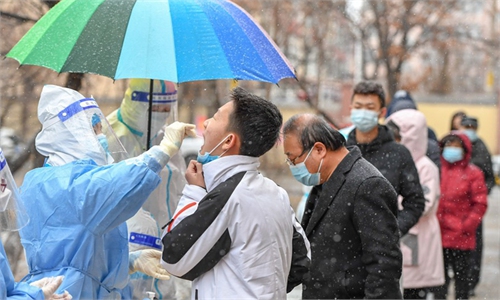
Citizens line up for nucleic acid test at a testing site in Changchun, northeast China's Jilin Province, March 20, 2022. Photo:Xinhua
With public attention focused on surging COVID-19 infections in China's largest metropolis Shanghai, some public health experts have called for greater efforts in fixing severe loopholes in local anti-epidemic work in Northeast China's Jilin Province particularly after a number of workers were reportedly infected during the construction of local Fangcang makeshift hospitals and local residents are faced with a food shortage amid an Omicron flare-up.The outbreak has been affecting the province for almost a month, and the tally of daily new infections continues growing, local data showed.
The province reported 1,150 new domestic cases and 1,032 asymptomatic cases on Tuesday, the local health authority said on Wednesday.
However, one of its hardest-hit cities - Jilin - began seeing confirmed cases drop after five days of restrictions and full-scale screening of mass nucleic acid testing.
The daily new cases outside the collective quarantine places, Fangcang makeshift hospitals and designated hospitals, declined from 528 on Thursday to 268 on Tuesday in the city of Jilin, down by 49.2 percent, which shows the staggered positive results in clearing off infections in communities, according to a press conference held by the local anti-epidemic work group on Wednesday.
It also showed that the virus' spread has been curbed and the risk of community transmission is controllable overall, the group said.
"It's good news, as the numbers showed that the newly reported infections were found in areas under control," Wang Guangfa, a respiratory expert at Peking University First Hospital, told the Global Times on Wednesday.
The province has been recording a COVID-19 surge caused by the Omicron variant in recent weeks, posing growing challenges in carrying out the dynamic zero tolerance policy and exposing some severe loopholes in local governance and anti-epidemic management.
These have been put under the spotlight especially after authorities in Changchun, capital of the province, apologized on Tuesday to local residents for the short supply of vegetables.
The Global Times interviewed with some local residents in Changchun, who complained about the shortage of vegetables and food, such as eggs.
The city's lockdown policy has posed challenges for "last-mile delivery," as some residents said they could not receive packages of vegetables prepared by the local authorities due to the lack of "door-to-door" delivery.
Local authorities have vowed to enhance the coordination and transportation of daily necessities, including enhancing deliveries to communities and volunteer services to make sure that products like vegetables, rice and oil could be promptly delivered to each household, Zhang Li, deputy director of the provincial health commission, told the press conference on Wednesday.
"We received one package of vegetables today, finally," a local resident surnamed Sun told the Global Times, who noted that she had been waiting for at least five days for the delivery.
As there was a long queue in a WeChat group for buying vegetables, the management team of Sun's community has not replied to the public request timely, which also sparked growing complaints among residents.
"It's hard to avoid such issues during the lockdown period," Sun Zhiming, a research fellow of the institute of economics of the Jilin Academy of Social Sciences, told the Global Times on Wednesday, as the supply chain could be affected and the local wholesale market also reported COVID-19 infections, affecting its normal operations.
However, certain issues in cities like Changchun and Shanghai, which hit the "pause button," could not be interpreted as a chaotic situation on the whole. The accumulated experiences in handling the epidemic mean that authorities have been making improvements since the early outbreak in Wuhan, Sun said.
Moreover, local authorities in Jilin city have been facing online criticisms after dozens of workers, who came from neighboring Heilongjiang Province to help construct Fangcang makeshift hospitals, were reportedly infected, revealing loopholes in the closed-loop management amid the outbreak.
Chinese financial media outlet Caixin reported on Wednesday that 90 of 160 workers tested positive after they helped build the Fangcang hospitals, and now they were quarantined in the same place they had built.
Li, a local social worker who has been working in a designated hotel for quarantine in Changchun, told the Global Times on Wednesday that local authorities failed to pay enough attention at the early stage of the outbreak.
"Many social workers like us have not been trained in a professional way, in terms of carrying out nucleic acid testing and running the daily management in quarantine sites," he said, noting that it poses more risks of being infected among workers.
As the province failed to focus on curbing the virus' spread at the early stage, the outbreak triggered a larger scale of transmission, which also increased the difficulties of local anti-epidemic work, Wang noted.
Zhang also told the press conference on Wednesday that local authorities have to enhance patrols in Fangcang hospitals and designated hospitals for COVID-19 treatment in order to streamline the process and supervise the management.




